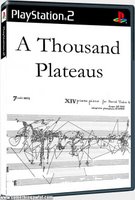Where did I want to go with that question? I had intended to talk about Deleuze and Guattari's contributions to what, for lack of a better term, might be called the philosophy of knowledge (and I'm purposefully trying to avoid using the word "epistemology" here). They develop this line of work both individually and collaboratively, though their most pointed statement comes in their final venture together, What Is Philosophy? If I'm reading WIP? and other works (e.g., Deleuze's Proust and Signs) correctly, concepts (what epistemologists might call "knowledge") inhere in things, and it's up to philosophers and other cultural workers to extract and articulate them.
I'll say that I'm seduced by this notion, though I'm uncomfortable with the kind of "reading" practice it seems to imply. Theoretically, from a Deleuzo-Guattarian standpoint, one is affected in such a way by a thing that she/he can be moved to extract whatever concept or concepts happen to inhere in it. Perhaps. But isn't that a hop, skip, and a jump away from the kind of literary reading--of feeling the meaning of a literary work "on your pulse"--that defined the work of people such as F. R. and Q. D. Leavis and others? How is Deleuzo-Guattarian knowledge production not, at some level, a sort of virtuoso protocol for reading culture?
 That question seems to me less lame, and honestly it's one I'm going to need some time to work through. For now, because this has been a fairly heady entry (most of my summer posts admittedly have been on the lighter side), I figured I'd end with an image my colleague John Lucaites sent me from somethingawful.com. Sony, like many these days, apparently is becoming Deleuzo-Guattarian..... ;)
That question seems to me less lame, and honestly it's one I'm going to need some time to work through. For now, because this has been a fairly heady entry (most of my summer posts admittedly have been on the lighter side), I figured I'd end with an image my colleague John Lucaites sent me from somethingawful.com. Sony, like many these days, apparently is becoming Deleuzo-Guattarian..... ;)